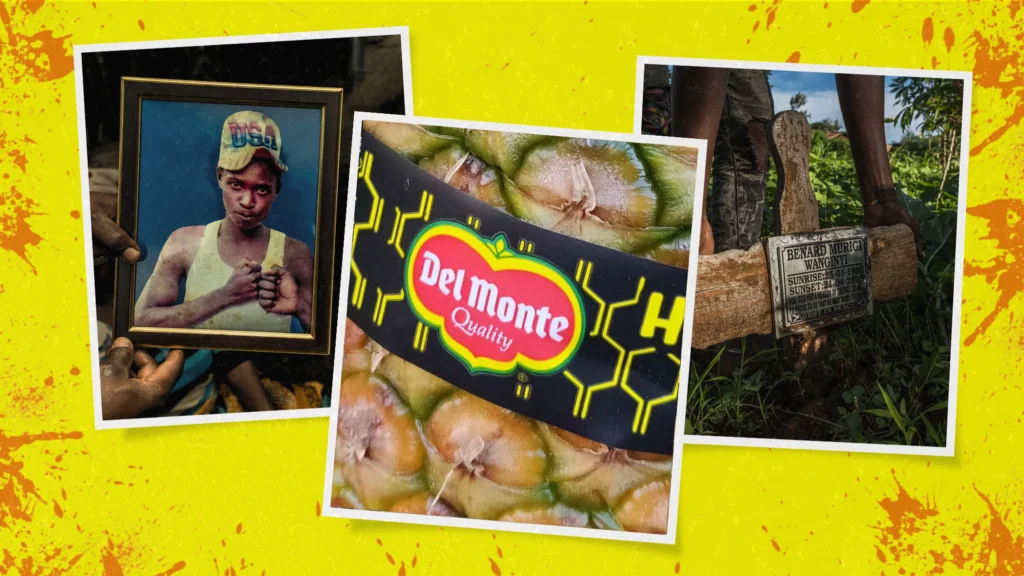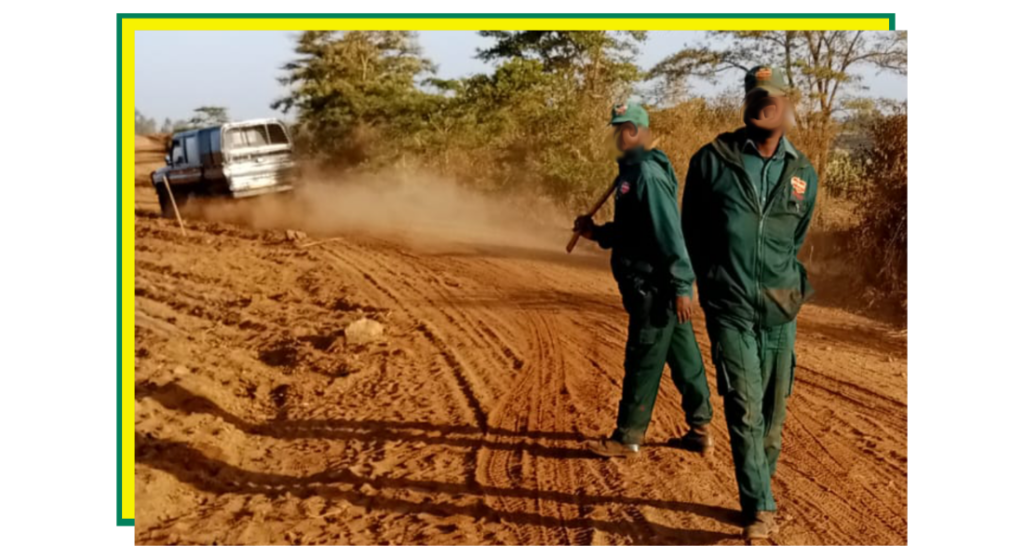The Del Monte Deaths: Shocking Claims of Violence at Pineapple Plantation
EXPOSURES - EXPOSÉS, 26 Jun 2023
Content warning: This story contains descriptions of graphic violence.

A photo of Bernard Murigi Wanginye (left) and his grave (right). Five former Del Monte guards currently stand trial for his murder.
Security guards working for the multinational food company Del Monte in Kenya have been accused of killing and brutally assaulting local villagers suspected of trespassing on its farm.
21 Jun 2023 – Stephen Thuo Nyoike’s battered body was found by the side of the road. He was 22. “He had been strangled with a wire,” says an eyewitness. “And there was a pineapple near the body.”
The last time anyone saw Stephen alive, they said he was being beaten with wooden clubs by security guards working for the food giant Del Monte. A post mortem showed his cause of death as strangulation and blunt-force trauma to the head. Further injuries to the wrists indicated his hands had been tied.
“Stephen was a good kid,” says his father, Joel. His son had been taking welding lessons for over a year and planned to set up his own workshop. But on the night of 30 August last year, he was killed violently after taking part in a botched pineapple raid on Del Monte’s megafarm outside of Thika, central Kenya. These attempts to steal fruit – often involving young men storming the premises on motorbikes – have become a semi-regular occurrence at the plantation, both a symptom and a cause of escalating tensions between local villagers living in poverty and the company whose sprawling farm dominates the area.
Stephen’s body was next to a road just outside of the farm when Joel arrived on the scene the next morning. “He was lying face-down,” he says. “I turned him over and he had injuries on his forehead. And his throat looked like it had been strangled with wire.”
Two men who were with Stephen on the raid said the group had been ambushed inside the farm by guards. “I looked back and saw the guards with torches,” remembers one. “I heard a harsh voice shouting: ‘Catch! Catch! Kill!’”
He remembers escaping and hiding in a bush, where he watched as the guards beat Stephen. He says the beating went on for about half an hour, until Stephen went quiet, and his motionless body was loaded onto a Del Monte pickup truck.
As Joel and other witnesses gathered around the body the next day, they noticed a large group of Del Monte guards watching them from across the road.
The second man remembers the shock he felt when he saw the body. “I have seen others who have been killed inside the farm,” he says, “but ‘Thuo’ was extreme. The wire…”


A global enterprise
Stephen is one of six people allegedly killed by Del Monte security guards in the last decade, with all the deaths centring around the same vast pineapple farm. The Bureau of Investigative Journalism and the Guardian have uncovered numerous allegations of violence perpetrated by guards on the farm, which supplies Del Monte’s pineapples to British supermarkets including Tesco, Asda and Sainsbury’s.
The shocking scale of the accusations has been captured by the law firm Leigh Day in a letter to Del Monte detailing 146 alleged incidents involving 134 locals over a decade. It includes claims of five deaths – all since 2019 – as well as reports of dozens of serious injuries and beatings that have left people unconscious. It also includes five allegations of rape.
Del Monte said that it took the allegations “extremely seriously” and that it has “instituted a full and urgent investigation” into them. It said that the conduct alleged is in “clear violation” of its “longstanding commitment to human rights” and the policies and procedures it has in place.
Tesco said it had suspended orders on all products sourced from the farm until an investigation is concluded. Waitrose said it expects its suppliers to comply with “strict ethical standards” and that it welcomed Del Monte’s review.
The British Retail Consortium, the industry body that represents UK supermarkets, said it welcomed Del Monte’s investigation and its “commitment to constant improvement in working practices”.
Del Monte’s 80 sq km plantation sits on the border of Murang’a and Kiambu counties, about 40 kilometres northeast of Nairobi, in a landscape marked with lush green vegetation and rich red soil. The area is also blighted by poverty, unemployment and drug use. This deprivation is despite the money generated by Del Monte, whose pineapple exports earned the country’s economy more than $100m in foreign exchange in 2018. This financial firepower has provided the company with political clout.
Among local villagers, the vast farm is often described as kwa guuka, meaning “our grandfather’s”. It is a bitter reference to the fact that many families were forcefully evicted from the land when it was first acquired by the company’s predecessor several decades ago.
The farm is the single largest exporter of Kenyan produce to the world. This huge global operation means that, although countless pineapples are grown in the area every year, virtually the only ones sold locally are those that have been stolen from the farm.
“The boys around don’t have anything much to do, and they need money for their survival. So the easiest way is to go and raid the farm, get the pineapples and sell to the public,” says Joel. “Mostly it’s driven by peer pressure and poverty.”
These conditions stand in stark contrast with the lifestyle enjoyed by the 237 guards employed by Del Monte at the farm, who have fully serviced schools, hospitals and sports grounds on company premises.
Their job is to patrol the huge farm with the aid of watchtowers, drone surveillance and guard dogs. The guards have been subject to violence themselves – thieves have been known to throw stones to ward them off, with one guard losing an eye in a recent raid – but this pales in comparison to the litany of allegations against them.
They work round-the-clock shifts in green Toyota Land Cruisers, occasionally accompanied by local police. Ngati police station is even located on the farm, close to Del Monte staff quarters.
Del Monte is the biggest private-sector employer in Kenya and the farm provides thousands of locals with work. But it hires many of its labourers on a casual basis and, locals say, lets them go after a few months. In January of last year Del Monte workers went on strike. The company responded by labelling the action illegal.

Stephen’s mother, Grace Mbinya, is now too traumatised to visit the garden where her son is buried, his grave surrounded by banana trees. In her grief she has wiped her phone clean of any pictures or links to him.
“He was a good boy, doing any house chores that I gave him,” she says tearfully. “The night before [he died], he had cooked part of the family dinner and we sat with him till late talking about a lot of things including his promise to buy me a piece of land where we would relocate.
“They should have just arrested and jailed him … where he is now, I can never see him and I will never see his children.”
Neither of the men who were with Stephen on the raid reported that night’s events to the police. “If you go to the police you will be arrested immediately so you don’t dare,” one says.
A senior police officer was unable to explain why, eight months later, there had been no investigation into Stephen’s death.
‘There’s no justice’
Dogged by poverty and brought up on the belief that Del Monte is too big to be tried in court, many families in the area have given up on pursuing justice for injuries and deaths. Even when action is taken, the justice system moves slowly.
Bernard Murigi Wanginye, a quarry worker, was 26 when he died after joining a pineapple raid in April 2019. When his father, Gilbert, went to the morgue to identify the body, he was so appalled by his son’s condition that he fainted.
“His head was badly damaged and I could not look for long,” says his mother, Alice. “I just walked out.”
“He used to support us very much,” says Gilbert. “Whenever I remember my son I really get down.”
Today, five former guards, who have since been fired by Del Monte, stand accused of Bernard’s murder. They pleaded not guilty in July 2019. The same month, a judge directed that the trial be “fast-tracked”. But four years later Gilbert is still waiting for the trial to take place.
On 27 April of this year, the guards appeared in court for another hearing. But a new hearing date was given for 5 September, delaying justice still further. Gilbert was not there. No one had told him about the hearing.
“There’s no justice at all for Bernard,” says Alice. “I’m urging the people out there to please assist us to get justice for our sons.”
It is understood that Del Monte says it has improved its security and safety practices since Bernard’s death in 2019. Planned or implemented improvements are said to include updated radio communications systems; training guards in new formal rules of engagement and enhanced formal processes around allegations of violence.
TO CONTINUE READING Go to Original – thebureauinvestigates.com
_________________________________________________
Reporters: Edwin Okoth, Matthew Chapman and Emily Dugan
Project editors: Franz Wild, Chrissie Giles and Robert Soutar
Editor: Meirion Jones
Production Editors: Alex Hess and Frankie Goodway
Impact producer: Miriam Wells
Fact checker: Alice Milliken
Photography: Brian Otieno for the Guardian/TBIJ unless specified
Our Law for Change project is funded by David Graham and our Environment project is funded partly by Quadrature Climate Foundation and partly by the Hollick Family Foundation. None of our funders have any influence over our editorial decisions or output.
Tags: Africa, Capitalism, Corruption, Culture of Violence, Elites, Finance, Greed, Inequality, Kenya, Profits, Structural violence
DISCLAIMER: The statements, views and opinions expressed in pieces republished here are solely those of the authors and do not necessarily represent those of TMS. In accordance with title 17 U.S.C. section 107, this material is distributed without profit to those who have expressed a prior interest in receiving the included information for research and educational purposes. TMS has no affiliation whatsoever with the originator of this article nor is TMS endorsed or sponsored by the originator. “GO TO ORIGINAL” links are provided as a convenience to our readers and allow for verification of authenticity. However, as originating pages are often updated by their originating host sites, the versions posted may not match the versions our readers view when clicking the “GO TO ORIGINAL” links. This site contains copyrighted material the use of which has not always been specifically authorized by the copyright owner. We are making such material available in our efforts to advance understanding of environmental, political, human rights, economic, democracy, scientific, and social justice issues, etc. We believe this constitutes a ‘fair use’ of any such copyrighted material as provided for in section 107 of the US Copyright Law. In accordance with Title 17 U.S.C. Section 107, the material on this site is distributed without profit to those who have expressed a prior interest in receiving the included information for research and educational purposes. For more information go to: http://www.law.cornell.edu/uscode/17/107.shtml. If you wish to use copyrighted material from this site for purposes of your own that go beyond ‘fair use’, you must obtain permission from the copyright owner.
Read more
Click here to go to the current weekly digest or pick another article:
EXPOSURES - EXPOSÉS:

